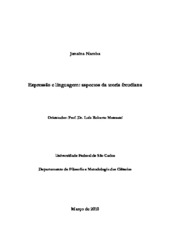| dc.contributor.author | Namba, Janaina | |
| dc.date.accessioned | 2016-06-02T20:12:19Z | |
| dc.date.available | 2013-10-21 | |
| dc.date.available | 2016-06-02T20:12:19Z | |
| dc.date.issued | 2010-03-09 | |
| dc.identifier.citation | NAMBA, Janaina. Expressão e linguagem: aspectos da teoria freudiana. 2010. 209 f. Tese (Doutorado em Ciências Humanas) - Universidade Federal de São Carlos, São Carlos, 2010. | por |
| dc.identifier.uri | https://repositorio.ufscar.br/handle/ufscar/4802 | |
| dc.description.abstract | The aim of this work is to examine some of the psychic aspects of the process of acquisition of verbal language in the theory of Freud. In a psychoanalytical perspective, this process takes place in the individual itself as well as in culture as a whole. Accordingly we examine it in its different stages, up to the point when the individual has acquired the use of verbal language. Even then, traces can be located of the process that led to language as such in verbal wit, in works of art, and in psychoanalytic therapy as conceived by Freud. Special emphasis is given to the mutual dependence, stated by Freud, between the physiological and psychological processes involved in the formation of language. Given that for Freud language arises in the individual at a moment when consciousness and the unconscious are yet to be completely separated from each other, it is only natural that he conceives the mechanisms that operate in grammatical languages to be absent and the symbols of expression to signify nothing beside themselves. Freudian conception of primeval language can then be said to be symbolic in the strong, philosophical acceptation of the term, as defined by Schelling: in this transitory form of language, words are not signs of conceptions nor do they point to external things, they are rather taken as things in themselves, complete and independent from all external reference. For Freud, their use prepares the individual for the advent of indirect, allegorical use of words that is typical of languages in their plain, grammatical form. But symbolic language does not disappear completely and without trace from the psyche, once verbal language has settled. Verbal wit, works of art, psychoanalytical therapy are instances of the permanence of the symbolic use of words in the realm of culture, and are as such to be taken as means of access to the unconscious. | eng |
| dc.description.sponsorship | Financiadora de Estudos e Projetos | |
| dc.format | application/pdf | por |
| dc.language | por | por |
| dc.publisher | Universidade Federal de São Carlos | por |
| dc.rights | Acesso Aberto | por |
| dc.subject | Psicanálise | por |
| dc.subject | Freud, Sigmund, 1856-1939 | por |
| dc.subject | Schelling, Friedrich Wilhelm Joseph von, 1775-1854 | por |
| dc.subject | Linguagem | por |
| dc.subject | Simbólico | por |
| dc.title | Expressão e linguagem: aspectos da teoria freudiana | por |
| dc.type | Tese | por |
| dc.contributor.advisor1 | Monzani, Luiz Roberto | |
| dc.contributor.advisor1Lattes | http://lattes.cnpq.br/2036732603638197 | por |
| dc.description.resumo | Este trabalho tem como propósito apresentar alguns aspectos psíquicos do processo de aquisição da linguagem verbal na teoria freudiana. Abordamos esse processo no indivíduo e na cultura, bem como a retomada de aspectos psíquicos envolvidos nessa aquisição, quando a linguagem verbal já se consolidou, por meio do chiste, da obra de arte e da clínica psicanalítica freudiana. Ao tomarmos os processos psíquicos como encadeados e em situação de dependência dos processos fisiológicos, temos que a aquisição da linguagem faz parte de um processo de tradução dos estímulos incidentes no sistema nervoso, até a representação psíquica desses estímulos sob a forma de ligação entre representações-coisa e representações-palavra. Na primeira tópica da teoria freudiana, o aparelho psíquico é composto por diferentes sistemas e o processo de aquisição da linguagem ocorre justamente no período em que consciência e inconsciente ainda não se encontram completamente diferenciados. Indicamos esse período como sendo um período simbólico conforme a concepção schellinguianna de símbolo. Desse modo a linguagem erigida nesse período é chamada por nós de linguagem simbólica. Uma linguagem transitória em que palavras são tomadas como coisas e que abrange as características tanto consciência quanto do inconsciente, até que sobrevenha a ligação entre representações-coisa e representações-palavra e haja uma total separação entre os sistemas. O chiste, a obra de arte e a sessão analítica seriam situações em que esse período é retomado por haver, nessas situações, uma suspensão da barreira da censura e, como que, um mergulho da consciência no inconsciente. | por |
| dc.publisher.country | BR | por |
| dc.publisher.initials | UFSCar | por |
| dc.publisher.program | Programa de Pós-Graduação em Filosofia - PPGFil | por |
| dc.subject.cnpq | CIENCIAS HUMANAS::FILOSOFIA | por |
| dc.contributor.authorlattes | http://lattes.cnpq.br/5016873975206205 | por |
